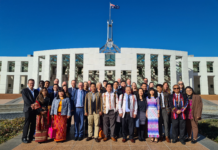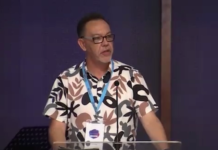
One of the most common questions I get asked in any conversation about church is “How do I make my church more missional?” My response is firstly to point them to great authors who know a lot more about this topic than I do. The likes of Mike Frost and others who literally wrote the book on new missional church.
If this very subtle buck passing does not work, I share a little of what I have tried to implement as a church planter and pastor of a church that is located in a very dry mission field – The Inner West of Sydney.
1. Refocus your Purpose outwards
The theological purposes of the church, as defined in Rick Warren’s “A Purpose Driven Church”, are:
- Ministry – The use of spiritual gifts and abilities to edify and equip the community of faith
- Worship – Both corporately and individually
- Discipleship – Working towards a greater commitment and expression of faith in Christ
- Fellowship – Building deeper, genuine relationships as a community
- Mission – Reaching out to win people to Jesus.
There is a library worth of theology on each of these areas by themselves as they provide a good summary of why the church exists. However, when it comes to increasing mission in your church, it involves refocusing each of these purposes around the idea of mission and allowing an attitude of mission to permeate each one.
- Mission becomes more focussed on going out of the church rather than just bringing people in
- Ministry becomes more focussed on expanding the kingdom of God through serving the community with our gifts rather than just serving each other
- Discipleship is more about equipping and releasing people to mission rather than just learning the bible
- Fellowship becomes more inclusive to those outside the church and less church centric
- Worship becomes more culturally relevant to the community in which the church resides and more varied in expression.
This requires the leaders of the church sitting with each ministry leader and helping each ministry to incorporate a mission mindset into what they do to achieve this subtle shift. Often this will be a major change in thinking for many volunteers and ministry leaders and has to be an active, ongoing choice that the church needs to make.
2. Re-evaluate your ministry mix
Ephesians 2:17-21 identified three audiences of the Gospel: the faithful (Saints), the friends (those who are close) and the far off (those far away).
For citywest.church, we run our mix of ministries through this template that identifies who our primary audience is for each ministry. For most churches the majority of ministry will be for the ‘faithful’, it is ministry that is focused on supporting and equipping people in the church in many different ways.
However, we also have ministries that are focused on helping people take the gospel to friends, family, neighbours and colleagues (friends).
In the final area we evaluate what ministries we have to reach those who are ‘far off’. Without proactive steps taken by the church, these people would never come in contact with a follower of Jesus let alone go to church. This last group includes overseas mission, local aid and other ministries to people the church has no relationship with.
An evaluation of your ministry mix through this template will quickly identify who your church is reaching and if you are a mission driven church or not. If your church has the majority of your ministry activity focused on people in the church then this needs to be addressed.
Once this evaluation has taken place a reworking of ministries has to be taken to ensure that the faithful are sent out, the far off become friends and the friends become the faithful.
3. Revitalise your culture
To be a church that is focused on mission the culture of a church needs to change. If mission is going to stick and move beyond merely a concept or a plan, the culture needs to adjust to create room for change. I see three areas that are important cultural shifts for mission to stick in a church:
A culture of responsibility:
In todays society and the church we shy away from responsibility for mistakes, weaknesses and failure. [It is time for the people of each church to stand up say “It is my fault that mission is not a priority”.] And to go beyond this and decide that change in the mission focus of the church is your responsibility. A decision that, even if no one else supports, is still your responsibility. No longer can we blame pastors and leaders for something we ourselves have not done. This theme flows through to following people up, actively discipling people and showing practical love to those who need it.
A culture of Grace
At citywest.church, one of our core values is that we are ‘Grace Responsive’. This means that we do not serve or do things out of tradition or religious expectation; we serve, share and care for each other as a response to the Grace that has been given to us by God. When we view the world and the church through this lens; judgment, gossip, cliques and in-fighting stop and a desire to reach out to the lost and the broken increases. We want people to have Grace through Christ like us. Are you grace responsive or are you religious? It is often a simple shift and sometimes we just need to articulate that “Grace is truly sufficient.”
A culture of support
Are you supporting your missionaries and ministries in reaching the local communities? Are you biasing resources of time and money to the work of people in the community? You need to evaluate how you are supporting the work that the church does in mission. Every church is different in how it supports; but some ideas may include training in mission, allowing space in the calendar for people to connect with those outside the church or raising up missional mentors and prayer triplets to partner with people stepping out to share faith.
4. Restate the method of Mission
When you say ‘mission’ it conjures vastly different images based on culture, age, theology and background. You may immediately think of anything from Billy Graham preaching in a stadium, to cross cultural missionaries reaching the least reached people groups in China. Mission is an area that many, much more qualified and experienced leaders could expand on more eloquently than I. However the method that you believe is most effective for your community needs to be stated and restated so that each person in the church knows what is expected. Each person needs to be equipped for the work of God in the broader community to be effective and confident.
As an example, I will share what I see as a good mission method and what I share with my church. Mission should be:
Intentional – I WILL go not HOPE to go
Mission is not just a good idea, it is a divine imperative of the church and has to move beyond just a good idea. It also needs to be more specific than into ‘all the world’. Mission is personal and needs to reflect this in who you desire to reach. “I will share with a person I know” or “I will start an outreach at that school” is more useful than just saying “I will reach the community”. A good start is to stop talking about it and put dates next to what you want to do.
Incarnational – WITH you not AT you
Are you going to the people you desire to reach with the Gospel or are you yelling at them from a distance. Simply putting a sign on your building and hoping that the community walk in the door is not mission. Christ demonstrated mission by becoming incarnate and walking amongst humanity to make God known. Our role is the same.
Contextual – For YOU not for ME
The message we bring to the world is for them not for us. If you are sharing faith, you know the Gospel and are living it. The goal is to connect the message of the gospel in a way that can be understood within the community. This changes from culture to culture but what we hold is an age-old message that must be shared in a manner that is understandable and relevant, otherwise we are nothing more than a ‘clanging gong’ – speaking to hear our own voice.
Practical – With ACTIONS not just WORDS
Mission is often just earning the right to share the gospel. The message we bring is not one of words but of hands and feet. Our message is built from loving our neighbour and going the extra mile, not out of duty but genuine love. The community will see your deeds before they understand your words.
Relational – The BEGINNING not the END
Every contact that you make with a person is the beginning not the end. I have heard of countless people who have been dumped by Christians once they are no longer a prospect for conversion. If you are a missionary you need to understand that a conversation with someone may be the beginning of a 20-year relationship with no fruit to show for it; and that is OK. Never treat people as prizes in a meat market. Mission is journeying with someone in relationship.



































